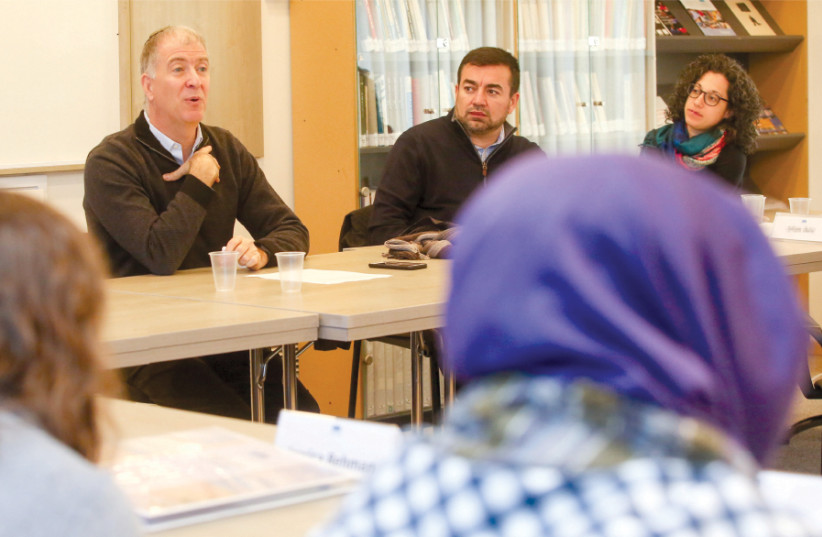We – one natural-born, half-Mizrachi and half-Ashkenazi Israeli (Shani), one Canadian-American oleh (Andrew), and one Jewish-American committed to staying in America (Elisha) – have lived together since September, participating in the Hartman Institute’s gap year/mechinah, Hevruta. Our shared experiences have convinced us that it is time to redefine the foundations of the Israel-Diaspora relationship with the collective Jewish future in mind. As the Ministry of Diaspora Affairs encourages us to celebrate Diaspora Week this week, we declare that we all must cultivate interpersonal bonds in ways that are relevant to Israelis and American Jews. Over time, building genuine friendships can lay the foundations for a shared vision for our future.
We came to the program looking for dialogue and connection. We now want to shift from thinking about a formal relationship between two communities thousands of miles away from one another to building a relationship between people who belong to a Jewish collective, yet also feel tied to their own respective countries.
It’s worth noting, for Elisha, the distinction between home and homeland. Elisha’s future, livelihood and pursuits are in America – it’s his home. Israel is the homeland belonging to his people. Israel represents the important idea that Jews are more than a religion. We are a distinct nation centered in Israel, yet spreading our values across the world.
We have observed a lack of respect for American Jews among Israelis. Many seem to wonder “How can you, living in America, actually help me or Israel? Who are you, who lives 6,000 miles away and will not serve in the IDF, to comment on Israeli military actions or even settlements?” At the same time, we know many Americans, especially in our generation, who lack any relationship with Israel because of their weak or non-existent Jewish identities. They simply don’t feel connected to Judaism or the Jewish people.
We also see, especially in progressive circles, how Israel is scapegoated. Viewed through an oversimplified version of the Israeli-Palestinian conflict, Israel is reduced to this international criminal, guilty of racial oppression. Many young American Jews feel they must choose between their progressive values and Zionism. These stressors threaten even the potential of the personal relationships we seek to build between younger generations of American Jews and their Israeli brothers and sisters.

Moreover, when we American Jews have talked about race and injustice in America, many of us have been shamed or shut down by progressives for coming from a place of white privilege. While it is true in many cases that appearing white has helped certain Jews achieve success in America, that attitude thins out our identities, neglects so much of our history, and ignores large portions of the multi-ethnic Jewish people.
It saddens us to see our generation of Israelis and Americans growing apart. Having lived together since September, we’ve learned from one another. We’ve participated in conversations about everything from home life to politics, Jewish identity to pop culture. Ultimately, we’ve gained insights into what Israelis can learn from Americans and vice-versa.
Shani concedes that many Israelis come to a joint program like ours because it would be cool to make American friends. She has grown up with Americanized teenage culture, with the idea that Americans are modern and trendy. Soon after getting to know her American peers, though, Shani realized that she could learn from them about religious life. She grew up secular, not engaging with many Jewish practices or traditions. She was shocked to meet Reform Jews who seemed genuinely passionate about Kabbalat Shabbat songs and modernizing Judaism. Their Judaism, though no more halachically-observant than hers, felt more connected, modern and fun.
For many Israelis, the alternative to halachically-observant Judaism is secularism, which in Israel often implies little to no religious engagement. Learning from Americans new and more meaningful ways to connect to Judaism could add so much meaning to the life of many Israelis, opening up a world of opportunities to be Jewish in the Jewish State. And, perhaps, a newfound Israeli secular connection to Judaism could help bridge the gap between secular and religious Israelis.
At the same time, American Jews struggle to appreciate the diversity of the Jewish people and the concept of Jewish peoplehood as a whole. Ashkenazism in America causes many of us to see Jewish culture as homogenous and white. For American Jews, developing relationships with Israelis would reveal many dimensions of the Jewish people. Here we encounter a broader range of Jewish culture, songs, foods and traditions – from Mimouna (a Moroccan party celebrating the end of Passover) to Chinah/Henna (an artistic, lavish, pre-wedding ceremony organized by Indian, Moroccan and Yemenite Jews to celebrate the bride and groom).
Ultimately, our American-Israeli bonding allowed us to expand our Jewish cultural religious, and political consciousness.
Learning more about Jewish diversity and deepening our understanding of multifaceted Jewish heritage and identity would also enhance how we engage with racial and ethnic social issues. Understanding our own place as an ethnic minority may help us appreciate the experiences of other minorities, while also giving us a tool to combat antisemitic generalizations.
For Israelis, building relationships with Jewish Americans can strengthen our openness to living full Jewish lives in Israel. And for Americans, Israelis have so much to teach us about our people and culture. The lessons we learn from one another will enhance Jewish lives and promote a more united, global Jewish future. That is how authentic, person-to-person relationships can forge a collective path forward for our generation.
The writers are students at the Shalom Hartman Institute’s Hevruta Gap-Year Program, a pluralistic program for North American and Israeli young adults based in Jerusalem.
